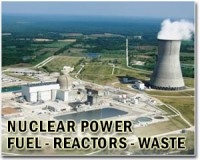 |
Tokyo (AFP) March 12, 2011 Japan, with scant energy resources of its own, relies on an extensive nuclear power network which authorities have always insisted is built to withstand the most powerful earthquakes. But the densely-populated nation faced atomic crisis Saturday after a massive earthquake caused cooling systems to fail in reactors at two plants, forcing the evacuation of tens of thousands of homes. Radiation 1,000 times above normal was detected in the control room of one plant and officials warned that a nuclear meltdown could be imminent after Friday's 8.9-strength tremor, which also unleashed a devastating tsunami. Authorities had to vent radioactive vapour to relieve pressure building inside reactors at the Fukushima No.1 and No.2 power plants, northeast of Tokyo, where system failures left core temperatures to soar unchecked. Reports citing the Japanese nuclear safety commission said radioactive caesium had been detected near Fukushima No. 1, about 250 kilometres (160 miles) northeast of Tokyo. Opposition to the nuclear industry is strong in Japan, where every year thousands still gather to mourn the victims of the two nuclear bombs dropped on Hiroshima and Nagasaki in the closing days of World War II. But scarce natural energy resources mean atomic power is seen as a necessary evil, with 54 nuclear plants providing about 30 percent of the country's electricity needs. Its nuclear facilities are built to withstand seismic shocks and automatically shut down in a significant earthquake, but Fukushima's emergency backup cooling systems failed, leaving its core glowing hot. Greenpeace said the damage left Japan "in the middle of a nuclear crisis with potentially devastating consequences", with experts fearing the fuel rods could melt. "Then you have the possibility of a greater release of radioactivity into the environment," said James Acton, a physicist who examined Japan's Kashiwazaki-Kariwa plant after a 2007 earthquake. If that happens Acton told CNN "there's a possibility of cancer in the long term -- that's the main hazard here." Public confidence in the country's atomic energy industry has ebbed in recent decades after a series of fatal incidents and toxic leaks which exposed hundreds of people to radiation. The worst of these accidents, a self-sustaining nuclear reaction which killed two workers at the Tokaimura uranium processing plant in September 1999, was the world's biggest atomic disaster since Chernobyl. More than 600 people were exposed to radiation and some 320,000 were forced to shelter indoors for more than a day, just two months after a horror 80-tonne leak of cooling water at western Tsuruga -- one of Japan's worst ever spills. Fears were renewed in August 2004, when four workers were scalded to death and several others were injured by non-radioactive steam at the central Mihama power plant. The Monju fast-breeder reactor had to be shut down after a massive sodium leak in December 1995 and there were fires and tritium leaks in 1997 which exposed dozens of people to radiation. Tokyo Electric Company (TEPCO), owner of the Fukushima plant and Japan's largest power firm, had to close all 17 of its reactors for checks in mid-2003 after it was found to have falsified dozens of safety reports to regulators. TEPCO was forced to admit it had covered up the appearance of cracks including those in steel "shrouds" enveloping the reactor core at its nuclear plants for years, although it was later independently confirmed they did not pose an immediate threat to the safety of nuclear plants.
Share This Article With Planet Earth
Related Links Nuclear Power News - Nuclear Science, Nuclear Technology Powering The World in the 21st Century at Energy-Daily.com
 High radiation in Japan nuclear plant, 'no health hazard'
High radiation in Japan nuclear plant, 'no health hazard'Tokyo (AFP) March 12, 2011 A Japanese nuclear safety panel said Saturday radiation levels were 1,000 times above normal in a reactor control room after a huge quake damaged a plant's cooling system, Kyodo News said. Public broadcaster NHK, quoting nuclear safety officials, said there was "no immediate health hazard" to nearby residents from a possible minute leakage, and people were urged to evacuate the area calmly. ... read more |
|
| The content herein, unless otherwise known to be public domain, are Copyright 1995-2010 - SpaceDaily. AFP and UPI Wire Stories are copyright Agence France-Presse and United Press International. ESA Portal Reports are copyright European Space Agency. All NASA sourced material is public domain. Additional copyrights may apply in whole or part to other bona fide parties. Advertising does not imply endorsement,agreement or approval of any opinions, statements or information provided by SpaceDaily on any Web page published or hosted by SpaceDaily. Privacy Statement |